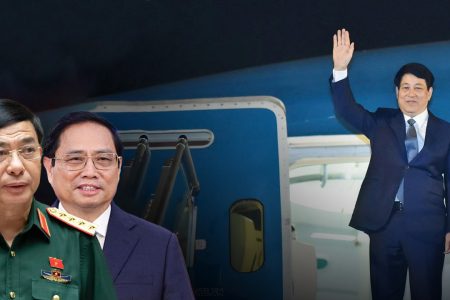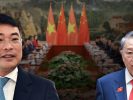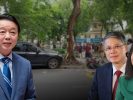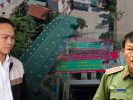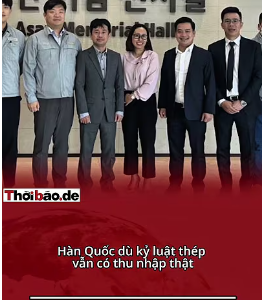
Dear General Secretary! The above social survey is a hoax, they can give any poll results they want.
Day by day, the sound of song singing is still bustling all over the world: „Praise whoever is good at drawing a spinning lamp. A paper elephant, a paper horse, it runs around… Paper elephant, a paper horse, runs around blindly.“ A new bottle of old wine, the old version remade. Spinning lights can have many levels and steps. The person pushing the lights on this floor knows where the paper elephant is on the other floor, as the ancients once saw through the cicadas, behind the cicada is the mantis, and behind the mantis is the sparrow, behind the sparrow is the bird shooter… The story about this lamp is somewhat similar to the anti-corruption story of General Secretary Nguyen Phu Trong. If people are sharp-eyed and enthusiastic, the crowd can gather to comment, praise or scold, hope or despair, anger, greed, greed, hatred, and delusion are all enough. Then the operator will bring up a new spinning lamp, a new stage, with paper elephants, new paper horses… It all goes on starting.”
Lost direction, not backward
When Professor Tran Dinh Huu still alive once said, Vietnam is not backward, but Vietnam is lost. Being backward still has the opportunity to catch up with more developed countries, but Vietnam chooses a completely different path compared to most countries in the world. And it is the model of governance of society – the country, that is, the „unlike any other“ institution, which is the root cause of national corruption. Corruption in Vietnam today is not only a trend, a movement, but as Dr. Nguyen Duc Thanh, Director of the Center for Economic and Strategic Studies (VESS) said, corruption has taken on a more „advanced“ form – a „state capture.“ Due to the nature of the totalitarian regime, that is, the leading elite is not elected by the people and the people do not have the right to remove them. With the „low throat“ of the untouchables, corrupt officials are rampant (President Truong Tan San likens them to a „swarm of worms„). Corruption is a frequent, widespread, and increasingly serious phenomenon. This does not have to be proven if you follow the increasing and serious corruption cases in the past 20 years.
Well, at the National Conference reviewing 10 years of anti-corruption work in the period 2012 – 2022 taking place on June 30, it was the architect of the „burning furnace“ that a tragic situation. Over the past 10 years, 2,740 party organizations have been disciplined, more than 167,700 party officials and members, of which 7,390 party members have been disciplined for corruption, including Politburo members and members of the party’s Central Committee, general officers in the armed forces. Speaking at the conference, Mr. Nguyen Phu Trong quoted Truyen Kieu to talk about current anti-corruption. He reveled in the „virtue rule„: „The root of goodness is in our hearts, the word „heart“ is equal to three words of talent / Having talent but relying on talent, the word „talent“ is associated with the word „misfortune!“ Mr. Trong did not hesitate to admit the situation: „My feet are still covered in calves, and I hold a torch to walk around.“ And yet, he was also bitter: „If leaders are unjust, there will be chaos everywhere!“ or „The superiors are not righteous, so ordinary are chaotic!“
Earlier, on the morning of June 17, at the headquarters of the Party Central Committee, General Secretary Nguyen Phu Trong and leaders of the Party and State chaired a conference on mastering and implementing Resolution No. 12-NQ/TW of the Politburo on March 16, 2022, on promoting the building of a truly clean and strong People’s Public Security force. The part where the General Secretary reads the speech prepared by his assistants has nothing to talk about, it’s still „full„, „determined“ and „push up…“, but in the middle, is when the party chief put down the paper and talked, which, admittedly, sounds quite pungent. Until now, Mr. Trong (a literature scholar) has never used low-level words, such as „not to do petty and cowardly things“ to warn his comrades. Or when National Television replayed his speech on June 30, the last part he trembled, said as if he was about to cry… Naturally, I felt sorry for him, because of the lonely feeling of emptiness, because of the heavy weight – of a corrupt ruling party, an unrecognized legitimacy—over a worn-out old man. He speaks like begging others, bitter… and helpless!
Absolute power, absolute corruption
“Power makes people corrupted. In the process of leading the „great burning furnace“ in Vietnam, Mr. Trong, on the one hand, admitted that he had to „lock power in the heart of the mechanism„, but on the other hand, denied that alienation was not a consequence of unchecked power. While from history up to the present, the problem that crosses social consequences is precisely how states have been established within them: dictatorship, totalitarian or liberal, or populist owner. All legislators, from antiquity to the past, were concerned with how to establish a Constitution that essentially did a virtually unique job: building a mechanism to control the state’s power, that is, to establish a polity in such a way that the branches of power restrain themselves and balance each other.
When Mr. Nguyen Phu Trong dreamed of a „cage to confine power„, he still placed the CPV’s Platform above the Constitution. Not only that, but he also slandered „separated three powers“ and „civil society.“ He considers the universal values of humanity as a „degradation of political thought“ to be dealt with. After locking power in a cage, he should have immediately handed over „the key to the cage of power“ to the people, here he was „self-sufficient.“ As the person holding the highest position in the Communist Party of Vietnam, Mr. Nguyen Phu Trong is normally responsible for the corrupt acts committed by his party members. Instead of apologizing to the people, Mr. Trong boasted that his comrades begged for forgiveness. Not surprisingly, his attitude has been met with criticism and ridicule on social media.
No less than once, the party’s Central Committee has made a request to perfect the institutions of Party building and rectification, promptly overcome inadequacies, and close the „gaps“ and „loopholes“ to prevent corruption. In addition, Mr. Trong also requested the authorities to effectively control the assets and income of those in positions of power, promote education and propaganda, and contribute to the fight against corruption. to strengthen the people’s confidence, and he also „rejected the false accusations of bad, hostile and opposing forces that fighting against corruption and handling wrongful cadres and party members are “internal fight” or “making factions.“ Mr. Trong added that, as a result of a recent social opinion survey conducted by the Central Commission on Education and Propaganda, the vast majority of people’s opinions (93%) expressed confidence in the Party’s leadership in the battle against corruption.
General Secretary, the above social survey is a hoax, they can give any poll results they want. In fact, the totalitarian Party/State „under his absolute and comprehensive leadership„, deliberately laid out many complicated and unreasonable laws, giving state officials chances to corrupt in all fields, from selling a house, making a birth certificate for a child, applying for a driver’s license in all levels. State agencies set up cumbersome and inefficient „mainstream“ machines, but they are an opportunity to run tricks, to hook people’s money. Dismantling the institution that gave birth to this system is the first step Mr. Trong should take if he wants to crack down on corruption. Otherwise, the more anti-corruption, the more officials „enter the furnace,“ Mr. Trong only put in the „furnace“ of corruption cases of several hundred billion or more, while embezzlement cases of hundreds of billion or less are still not punished. The officials involved in corruption are very sophisticated, and very discreet in all departments, from the police, and traffic to tax real estate and customs.
Thoibao.de (Translated)
















